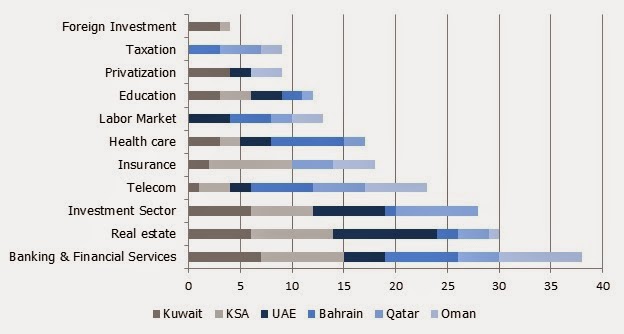This article was published in The August 2014 issue of The Gulf Magazine
Regulations and regulatory reforms are in vogue these days. The GCC has been witnessing a swathe of regulatory reforms in various sectors. How important is it to calibrate and balance reforms and regulations? This question has become hugely important in this setting.
Regulations and regulatory reforms are in vogue these days. The GCC has been witnessing a swathe of regulatory reforms in various sectors. How important is it to calibrate and balance reforms and regulations? This question has become hugely important in this setting.
Broadly speaking,
regulations have the following characteristics:
1. Counter-cyclical nature: We see that
policy makers wake up only when there is a disaster in the making! The global
financial crisis of 2008 is a great example, post which, a wave of regulations evolved
that was mainly aimed at the financial sector. We hardly see regulators active
when the going is good. This is actually counter intuitive. Strong regulations
should be introduced when the going is good, so that the stakeholders have the
energy and the time to pursue them effectively. Locking the stable after the
horses have bolted away does not make good sense!
2. Market Maturity: Regulations
can be illustrated as distillations of wisdom gained from ongoing market
experiments. Markets evolve over a period of time through multiple experiences
and regulations are nothing but an accumulation of such experiences. The
troughs and peaks as the markets waltz through time enable regulators to absorb
lessons and implement relevant checks and balances as part of the continuous
movement towards greater perfection. In
that sense, regulations are milestones that indicate the levels of market
maturity.
3. Investor Confidence: Properly
introduced regulations and reforms can go much towards enhancing investor
confidence. Lack of investor confidence primarily stems from a poor regulatory
architecture. A case in point is the emerging and frontier markets, which in
spite of its attractiveness, nevertheless suffers from poor investor confidence
(especially foreign investors).
4. Ease of Doing Business: Regulations
can go a long way in easing the way business is conducted. If enacted poorly, regulations
can also contribute to the opposite. It is generally considered a best practice
to measure the effectiveness and success of a particular regulation based on
how well it facilitates ease of doing business. Ease of doing business is
generally talked about in the context of foreign investors. I feel it does
apply in equal measure to local businessmen.
5. Global Perception and Brand Building: Regulations can also contribute to enhanced and improved
global perception about a particular market. Preservation of investor rights,
intellectual property, speed of legal trials, can be cited as some examples
that lead to the strengthening of a particular location or city as a brand
(e.g.,Singapore). Major decisions, including setting up of manufacturing units,
are critically based on the strength of global perceptions.
In the context of the
aforementioned characteristics or essential features of regulations, it is
worth mapping the framework to the GCC environment. The below chart illustrates
the number of reforms, sector wise in the GCC, since 2008. It is interesting to
note that foreign investment is an area where there have been only subdued
regulatory movements; while Banking and Financial Services has witnessed
intense regulatory pronouncements. There can be reasons for this. Attracting
inward foreign capital may not be an immediate priority for liquidity rich GCC
states. However, FDI is just not about attracting capital, only. Foreign
investment can also enhance the talent pool in the region, bring new
technologies, and above all, improve investor confidence and upgrade global
perception. On the contrary, Banking and Financial Services is a dominant and highly
mature sector contributing to over 50% of the market capitalization in the
respective stock markets of the GCC countries. In the absence of an active debt
market and due to a paucity of long-term funding instruments, banks end up
being the primary mover of the financial wheel. This explains the “over
regulated” nature of this sector.
Indicative Number of
Reforms in GCC (2008-2013)
Source:
Markaz Research
So, what then makes regulations effective?
1.
Balance: Under regulation may
inhibit the growth of a sector; while excessive regulations may increase the
cost of doing business. Hence, the need to balance regulations carefully.
2.
Oversight: Declaring
a regulation is only the opening gambit, while the real challenge lies in the implementation
on the ground. A case in point are the Capital Market Authorities across many
GCC countries. While CMAs’ require a spate of documentation to be submitted by
the companies, they may not have the commensurate infrastructure or technology
to monitor all the submissions and take action where necessary.
3.
KPI's: Regulations become
effective only when regulators don’t limit their role to just policing and fining.
The agenda of regulators should be more broad based and should include the
development and growth of the sectors that they are regulating. If after a
decade of regulations, a sector has failed to demonstrate growth and
development, then the regulators should also share the blame!
4.
Cost: Mindless regulations
should be avoided as compliance cost is an important component with respect to economic
efficiency. This is particularly true of “imported regulations”, which under
the name of best practices, are whisked in with little consideration given to
their applicability vis-à-vis local realities.
In summary, it can be said that there can be no doubt about the
integral and important role that effective regulations have. The role that they
play in the organized development of a market cannot be understated or
deemphasized. However, calibrating regulations and achieving a fit balance is
the need of the hour.
.jpg)
No comments:
Post a Comment